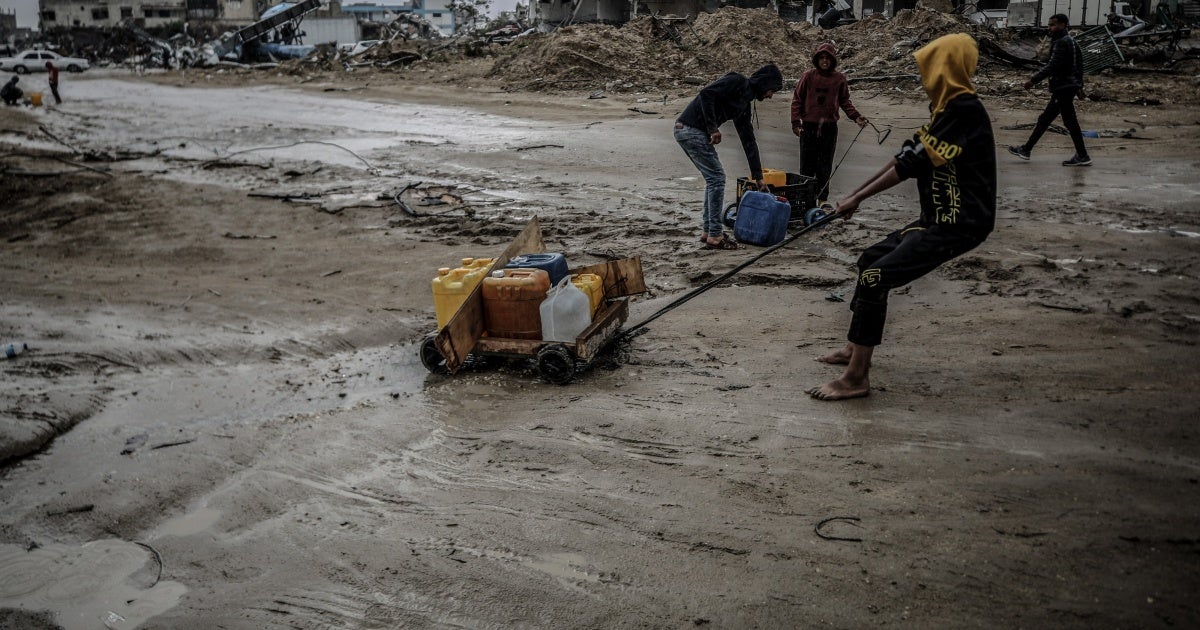
Israeli Plan Nears Extermination in Gaza
The Israeli government’s plan to demolish what remains of Gaza’s civilian infrastructure and concentrate the Palestinian population into a tiny area would amount to an abhorrent escalation of its ongoing crimes against humanity, ethnic cleansing, and acts of genocide, Human Rights Watch said today.
Israeli authorities, who have blocked the entry of aid, food, fuel, and medical supplies into Gaza for 75 days, have reportedly decided on a plan that would include “flatten[ing]” buildings and displacing Gaza’s entire population into a single “humanitarian area” if no “deal” with Hamas is reached by mid-May 2025. The dire humanitarian situation stemming from the unlawful blockade and plans to escalate forced displacement and widespread destruction demand a more robust response from other governments and institutions, especially the United States, France, Germany, the European Union, and the United Kingdom. Human Rights Watch called on all parties to the Genocide Convention to do more to prevent further atrocities, including ending weapons sales, military assistance, and diplomatic support to Israel, imposing targeted sanctions on Israeli officials, and reviewing and considering suspending bilateral agreements.
“Hearing Israeli officials flaunt plans to squeeze Gaza’s 2 million people into an even tinier area while making the rest of the land uninhabitable should be treated like a five-alarm fire in London, Brussels, Paris, and Washington,” said Federico Borello, interim executive director of Human Rights Watch. “Israel’s blockade has transcended military tactics to become a tool of extermination.”
The United Nations has warned that Gaza is facing its worst humanitarian crisis since the beginning of hostilities. The world’s foremost experts on food insecurity, the Integrated Phase Classification (IPC), said on May 12 that there is a “high risk” that famine will occur in Gaza in the coming weeks, with one in five people likely to face starvation. The World Health Organization said on May 11 that Gaza is experiencing “one of the world’s worst hunger crises, unfolding in real time,” citing a Gaza Ministry of Health report that at least 57 children have died from malnutrition in Gaza since the blockade began. Israeli Defense Minister Israel Katz reiterated in mid-April that Israel’s “policy is clear: no humanitarian aid will enter Gaza.” National Security Minister Itamar Ben-Gvir said at the time: “As long as our hostages are dying in tunnels, there is absolutely no reason to allow even a gram of food or aid.”
According to the Israeli government, 58 Israeli hostages are still believed to be held in Gaza, of whom 23 are believed alive. Palestinian armed groups should immediately and safely release all civilians they detain, just as Israeli authorities should immediately and safely release all unlawfully held Palestinians.
In early May, Israeli Prime Minister Benjamin Netanyahu’s security cabinet approved a plan dubbed “Gideon’s Chariots,” which it says could start as soon as US President Donald Trump’s visit to the region concludes on May 16. The plan involves forcibly displacing much of the Palestinian population of Gaza while seizing and occupying the territory. “There will be no in-and-out,” Netanyahu announced on May 5. Israel is “finally going to conquer the Gaza Strip,” said Finance Minister Bezalel Smotrich, who also serves as a minister in the Defense Ministry and sits on the security cabinet. Smotrich, who has said that Gaza will be “completely destroyed” and its Palestinian population will “leave in great numbers to third countries,” also suggests these plans should not be adjusted, even if hostages are released.
When coupled with the systematic destruction of homes, apartment buildings, orchards and fields, schools, hospitals, and water and sanitation facilities, as well as the use of starvation as a weapon of war-acts that amount to war crimes, crimes against humanity including extermination, and acts of genocide-these plans trigger the “duty to prevent” under the Genocide Convention. For the 153 states that are parties to it, the duty to prevent genocide arises as soon as a state learns, or should normally have learned, of a serious risk that genocide may be committed. A definitive determination that genocide is already underway is not required, as Human Rights Watch set out in an April 2025 intervention in a case currently before the UK courts challenging the UK government’s decision to continue to license military equipment used by Israeli forces in Gaza.
Israel and the United States are advancing a new plan to use private military contractors to provide aid only to certain parts of Gaza. In a May 4 joint statement, the UN and aid groups operating in Gaza warned that the plan won’t reach the most vulnerable, “appears designed to reinforce control over life-sustaining items as a pressure tactic,” and “will further entrench forced displacement.” The IPC said the plan is “highly insufficient to meet the population’s essential needs.”
Virtually all of Gaza’s population has already been displaced, while Israeli authorities have pursued forced displacement as state policy, rendering the strip largely uninhabitable. Israeli officials have confirmed that going forward, areas “cleared” by their military would follow the “Rafah model,” a euphemism for the destruction of civilian infrastructure.
The Genocide Convention obligates states parties to “employ all means reasonably available to them, so as to prevent genocide so far as possible.” States that are party to the 1948 Genocide Convention, including the United States, United Kingdom, France, and Germany, risk legal liability for failing to act to prevent genocide in Gaza, Human Rights Watch said. The International Court of Justice (ICJ) in 2007 found that the obligation applied extraterritorially “to a State wherever it may be acting or may be able to act in ways appropriate to meeting the obligation.” The United States, the United Kingdom, France, and Germany, which have strong ties with or influence over the Israeli government, have a heightened responsibility to act.
Aid agencies have 171,000 metric tons of pre-positioned food in the region, which would be enough to sustain 2 million people in Gaza for three to four months, but they have not been allowed to enter since March 2, 2025. Bakeries, community kitchens, and relief organizations, including the World Food Programme and World Central Kitchen, have been forced to stop operations because their food stocks ran out. People now spend hours waiting for a few gallons of water or rotten flour. According to the International Water Association, 90 percent of households were struggling with water scarcity in the first half of April, often forced to choose between showering, cleaning, and cooking. That percentage has likely risen because fuel to run desalination plants and water pumps for wells has not entered Gaza since March 2.
Israeli authorities have made it impossible to effectively deliver assistance. Increasing use of evacuation orders has also trapped civilians in enclaves without food or water. According to a survey by Relief Web, 95 percent of the aid organizations operating in Gaza had to suspend or dramatically cut services since the escalation of hostilities on March 18 because of widespread Israeli bombing or onerous Israeli restrictions.
The ICJ has issued three rounds of provisional measures in South Africa’s genocide case against Israel. Israeli authorities have flouted them all.
Continued weapons sales, military assistance, and diplomatic support to the Israeli government despite overwhelming evidence of atrocity crimes also expose governments and officials to the risk of complicity. Governments should halt arms transfers immediately. They should also support international accountability efforts, including by enforcing the arrest warrants of the International Criminal Court, Human Rights Watch said.
Governments should also immediately review bilateral agreements with Israel, including the EU-Israel Association agreement, which identifies “respect for human rights and democratic principles” as an “essential element” of the agreement. Belgium, Finland, France, Ireland, the Netherlands, Portugal, Spain, Slovenia, and Sweden support such a review.
Both the UK-Israel Trade Partnership Agreement and the UK’s 2030 roadmap for UK-Israel bilateral relations should be revised, including removing provisions that shield or attempt to shield Israel from accountability, Human Rights Watch said.
“States that are party to the Genocide Convention committed themselves not just to punish genocide, but also to prevent it from taking place,” Borello said. “Failing to act to stop Israeli authorities from starving civilians in Gaza and further rendering it unlivable flies in the face of the very purpose of the convention.”
https://www.hrw.org/news/2025/05/15/gaza-latest-israeli-plan-inches-closer-extermination


